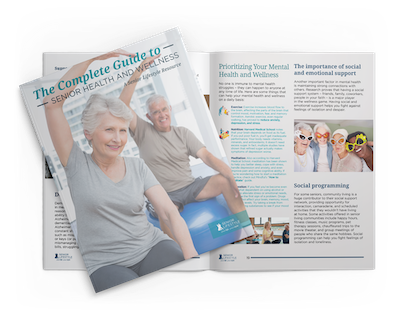As we age, maintaining cognitive function becomes increasingly vital for a fulfilling and independent lifestyle. Fortunately, one of the most powerful tools for preserving brain health lies right on our plates. Nutrient-rich foods fuel both our bodies and minds, helping protect against age-related cognitive decline and supporting overall well-being.
Join us as we share the best foods and nutrients to eat for brain health as well as some foods and substances to avoid.

Download The Complete Guide to Health & Wellness for Seniors
As people grow older, their health and wellness needs change. Read our eBook, “The Complete Guide to Health & Wellness for Seniors” for everything you need to know about staying healthy and happy as we age.
Download the GuideThe Best Nutrients To Help Support Brain Health
A study by the National Institutes of Health confirms that specific nutrients can help support brain health, which boosts cognition and emotional health.
Some of the best nutrients include:
- Antioxidants – Antioxidants help protect the brain from damage and may also reduce inflammation and memory loss. Broccoli, carrots, potatoes, and spinach are all high in antioxidants.
- B vitamins – B vitamins like B12 and folic acid help make and maintain brain chemicals. They also break food down into energy for the whole body. Good sources of B vitamins include dairy, eggs, leafy greens, legumes, meat, poultry, and seafood.
- Choline – This nutrient is used in many chemical reactions in the body. It’s important for the development of normal brain function and in the maintenance of the nervous system. Like B vitamins, choline is found in dairy, eggs, fish, meat, and poultry.
- Omega-3 fatty acids – Fatty acids create the cell structure and are vital for the proper function of the nervous system. Fish and other seafood, along with nuts and seeds, are high in omega-3s.
- Vitamin E – This vitamin protects cells from being destroyed by other processes in the body. Vitamin E is found in nuts, seeds, greens, and some seafood.
It’s important to take in these nutrients from a variety of food sources in a healthy, balanced diet.
Top 10 Brain Foods for Seniors
These 10 brain foods can be incorporated easily into your diet to support optimal brain health.
1. Avocados
Avocados are a unique fruit known for their creamy texture and rich flavor. They are packed with monounsaturated fats, particularly oleic acid, which is beneficial for heart health and may also support brain function. Oleic acid helps improve blood flow to the brain, providing essential nutrients and oxygen.
Avocados also contain folate, vitamin K, and potassium, all of which contribute to overall brain health. Folate is crucial for cognitive function and mood regulation. Vitamin K is essential for maintaining brain health and may help protect against age-related cognitive decline. Potassium helps regulate blood pressure, ensuring proper blood flow to the brain, which is vital for cognitive function.
2. Berries
Berries, including blueberries, strawberries, and raspberries, are renowned for their high levels of antioxidants. These antioxidants help combat oxidative stress and inflammation in the brain, which can contribute to cognitive decline.
Studies have demonstrated that regular consumption of berries, particularly blueberries, may improve memory, delay age-related cognitive decline, and reinforce overall cognitive function in older adults. Berries are also rich in vitamins, minerals, and fiber, making them an excellent addition to a brain-healthy diet.
3. Dark Chocolate
Dark chocolate is not only a delicious treat but also a potent source of antioxidants and beneficial compounds. Dark chocolate contains flavonoids, which have been linked to improved cognitive function and neuroprotective effects. Flavonoids help increase blood flow to the brain, improve neuronal function, and promote neuroplasticity.
Additionally, dark chocolate contains caffeine and theobromine, stimulants that can increase alertness and improve cognitive performance. Consuming moderate amounts of dark chocolate has been associated with better memory, attention, and overall cognitive function in seniors.
4. Eggs
Eggs are a nutrient-dense food packed with essential nutrients for brain health, including choline, vitamin B12, and folate. These nutrients are involved in memory and cognitive function, and they are essential for maintaining cognitive health, particularly in seniors.
Vitamin B12 is crucial for neurological health—deficiency has been linked to cognitive decline and an increased risk of neurodegenerative diseases. Folate and choline can also help battle cognitive decline as well as play a role in neurotransmitter synthesis.
5. Fatty Fish
Fatty fish like salmon, trout, and sardines are rich in omega-3 fatty acids, particularly EPA and DHA. These omega-3 fatty acids are crucial for brain health as they play a pivotal role in building and maintaining the structure of brain cell membranes. Additionally, EPA and DHA have anti-inflammatory properties, helping to reduce inflammation in the brain, which is linked to cognitive decline and diseases such as Alzheimer’s and Parkinson’s.
Research suggests that regular consumption of fatty fish may improve cognitive function, memory, and overall brain health in seniors. Omega-3 fatty acids have been associated with a reduced risk of age-related cognitive decline and may even help prevent or delay the onset of conditions like Alzheimer’s disease.
6. Green Tea
Green tea is celebrated for its numerous health benefits, including its positive effects on brain health. It contains antioxidants that have neuroprotective properties. These antioxidants can cross the blood-brain barrier and help the brain.
Green tea also contains caffeine and L-theanine, a unique amino acid that promotes relaxation without drowsiness. The combination of caffeine and L-theanine can reinforce cognitive function, improve mood, and increase alertness. Regular consumption of green tea has been associated with better memory, attention, and overall cognitive function in older adults.
7. Leafy Greens
Leafy greens like spinach, kale, and Swiss chard are nutritional powerhouses, packed with vitamins, minerals, and phytonutrients that support brain health. These greens are particularly rich in vitamin K, folate, and lutein.
Vitamin K is essential for forming a type of fat found in brain cell membranes. Folate, on the other hand, plays a crucial role in regulating amino acid levels in the blood; high levels of certain amino acids have been linked to an increased risk of cognitive impairment and dementia. Lutein, an antioxidant found in leafy greens, has been associated with better cognitive function and may help protect against age-related cognitive decline.
8. Nuts and Seeds
Nuts and seeds, such as walnuts, almonds, flaxseeds, and chia seeds, are rich in healthy fats, antioxidants, vitamins, and minerals that support brain health. These include a plant-based omega-3 fatty acid, vitamin E, and magnesium.
Vitamin E is a powerful antioxidant that helps protect brain cells from damage, while magnesium is involved in some brain function and may help improve cognitive performance.
9. Turmeric
Turmeric is a vibrant spice commonly used in traditional Indian cuisine and medicine. It contains a bioactive compound called curcumin, which has potent antioxidant and anti-inflammatory properties. Curcumin can cross the blood-brain barrier and bolster the brain’s memory and cognition functions.
Research suggests that curcumin may help protect against age-related cognitive decline and neurodegenerative diseases like Alzheimer’s. Curcumin’s anti-inflammatory effects may reduce neuroinflammation, while its antioxidant properties help protect brain cells from damage.
10. Whole Grains
Whole grains like oats, quinoa, brown rice, and barley are complex carbohydrates that provide a steady and sustained source of energy to the brain. They are also rich in fiber, vitamins, and minerals, including vitamin B complex, magnesium, and zinc.
B vitamins are essential for brain health as they play key roles in neurotransmitter synthesis and cognitive function. Magnesium is involved in over 300 biochemical reactions in the body, including those related to brain health and cognition. Zinc is crucial for brain function and memory formation.
The Worst Foods for Your Brain Health
There are several foods that can negatively impact your brain.
Alcohol
Consumed in excess, alcohol can harm the brain. Chronic use decreases brain volume and disrupts neurotransmitters in the brain. It also can lead to behavioral changes, memory loss, and sleep disruption.
Aspartame
This artificial sweetener is used in many sugar-free products but has been linked to behavioral and cognitive problems. It also may impair memory and increase stress in the brain.
Highly processed foods
These convenient foods tend to be high in fats, salt, and sugar while being low in nutrients. They cause weight gain and can have a negative effect on your brain.
Mercury
The heavy metal mercury can contaminate fish, which when ingested by humans concentrates in the brain, kidneys, and liver. Mercury toxicity disrupts the central nervous system and neurotransmitters while stimulating neurotoxins, resulting in damage to the brain. Mercury can be found mostly in wild seafood, so intake should be limited.
Refined carbohydrates
These include highly processed grains, such as white flour and sugar. They can spike your blood sugar and insulin levels, and a study published in the medical journal Nutrients says high glycemic load can impair memory. Excessive carbohydrates may also cause inflammation, which is recognized as a risk factor for Alzheimer’s and dementia.
Sugary drinks
Energy drinks, soda, sports drinks, and even fruit juice can contain too much sugar. An excessive intake of sugary drinks can increase the odds of developing type 2 diabetes, which is a risk indicator for Alzheimer’s disease. High blood sugar also increases the risk of dementia, even for those without diabetes.
Trans fats
Natural unsaturated fats are not an issue when consumed in animal products like dairy and meat, but artificial trans fats in frosting, margarine, pre-packaged foods, shortening, and snack foods can impair brain health. Studies have found an increased risk of Alzheimer’s, cognitive decline, decreased brain volume, and poor memory with higher consumption of artificial trans fats.
Additional Nutritional Considerations
Here are some additional considerations for overall senior nutrition:
Drink Water Often
Some seniors may lose their sense of thirst as they age, making dehydration a risk. Stay away from added sugars or salts, and learn which beverages are the better choices for your circumstances.
Eat a Variety of Foods
Use the food groups as a guideline, and try to eat from each one regularly. Choose foods with little or no added saturated fats, sodium, or sugar.
Focus on Nutrients
Try to select foods that will provide calcium, dietary fiber, potassium, vitamin B12, and vitamin D. Talk to your doctor to see if you may need to take supplements to reach your daily requirements.
Get Enough Protein
Protein, which can help maintain muscle mass, can be taken in through such meats as lean beef, white meat poultry, and seafood as well as through dairy, eggs, and beans.
Maintain a Healthy Weight
Keep an eye on your meal portions and consider limiting snacks to healthy options, such as fruits or vegetables. For example, try snacking on carrots or celery with peanut butter or raisins.
Stay “Hale and Hearty” with Senior Lifestyle
Maintaining brain health is crucial for seniors to lead fulfilling and independent lives. By incorporating nutrient-rich foods like fatty fish, berries, leafy greens, nuts, and seeds into your diet, you can help bolster your cognitive function, protect against age-related cognitive decline, and promote overall health.
At Senior Lifestyle, we do all of this work for you. Our residents enjoy restaurant-style dining with delicious, nutrient-packed meals, meaning less time spent shopping, cooking, and cleaning and more time doing the things they love. Whether you’re looking for Independent Living, Assisted Living, or personalized Memory Care in our Embrace Neighborhoods, you’ll find a place where comfort, care, and connection come together.
Find out more about Senior Lifestyle or schedule a visit today!

